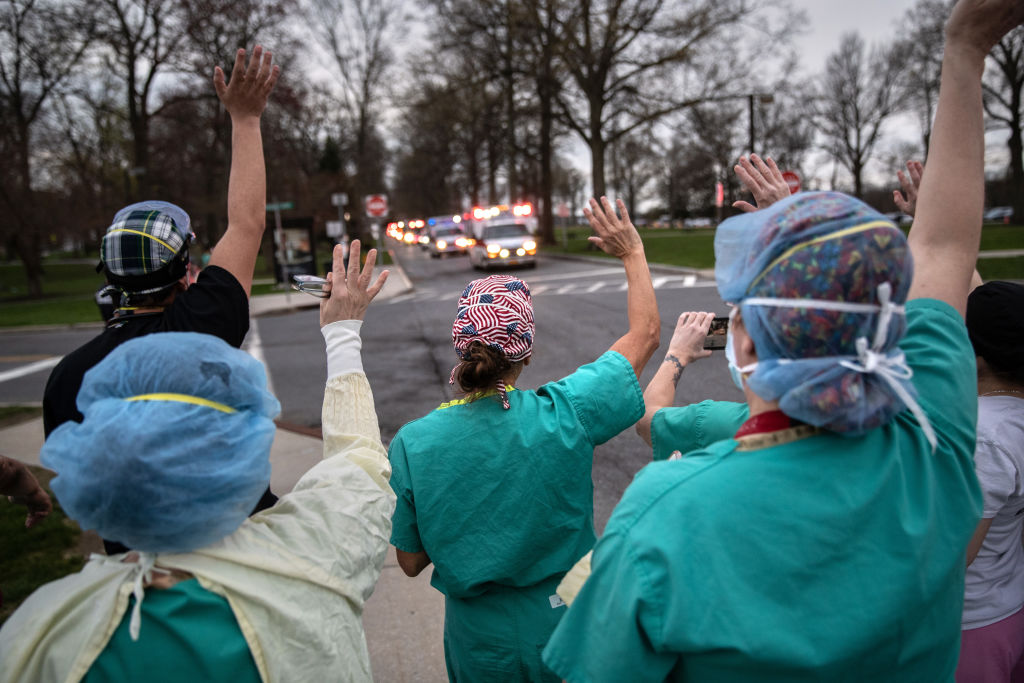Doctors say growing 'toolbox' of coronavirus treatments provide bright spot in pandemic fight


A free daily email with the biggest news stories of the day – and the best features from TheWeek.com
You are now subscribed
Your newsletter sign-up was successful
There's no COVID-19 cure yet, but health care workers can still count many tiny victories that are making the fight easier.
In the early days of the coronavirus pandemic, doctors "were flying blind" as they tried to treat a disease with mysterious symptoms and very little research, Jose Pascual, a critical care doctor at the University of Pennsylvania Health System, tells The Washington Post. But health care workers everywhere have since "devised a toolbox, albeit a limited and imperfect one, of drugs and therapies" they believe are improving patients' chances of survival every day, the Post reports.
When Penn Medicine hospitals first started receiving coronavirus patients, they were ready to focus on patients' lungs, so they stockpiled ventilators and trained workers to treat breathing complications, Pascual told the Post. Yet coronavirus patients soon started throwing doctors "curveballs" in the form of kidney, liver, skin, and brain complications, Pascual described. Doctors around the country also noted how seemingly healthy patients could actually have "abnormally low oxygen levels," the Post writes.
The Week
Escape your echo chamber. Get the facts behind the news, plus analysis from multiple perspectives.

Sign up for The Week's Free Newsletters
From our morning news briefing to a weekly Good News Newsletter, get the best of The Week delivered directly to your inbox.
From our morning news briefing to a weekly Good News Newsletter, get the best of The Week delivered directly to your inbox.
But those shocking developments quickly became lessons. Hospitals started quickly measuring oxygen levels in any suspected coronavirus patients, and learned how to boost breathing support for patients. They knew to look for unexpected side effects in other parts of the body. And after some once-promising drugs proved unhelpful in the coronavirus fight, doctors have been able to rule them out in favor of more effective drugs.
Of course, there's still no definitive cure or even treatment regimen for COVID-19. Doctors are all using experimental approaches that will have to be further researched through randomized clinical trials before they're approved for general use. Read more at The Washington Post.
A free daily email with the biggest news stories of the day – and the best features from TheWeek.com
Kathryn is a graduate of Syracuse University, with degrees in magazine journalism and information technology, along with hours to earn another degree after working at SU's independent paper The Daily Orange. She's currently recovering from a horse addiction while living in New York City, and likes to share her extremely dry sense of humor on Twitter.
-
 Tourangelle-style pork with prunes recipe
Tourangelle-style pork with prunes recipeThe Week Recommends This traditional, rustic dish is a French classic
-
 The Epstein files: glimpses of a deeply disturbing world
The Epstein files: glimpses of a deeply disturbing worldIn the Spotlight Trove of released documents paint a picture of depravity and privilege in which men hold the cards, and women are powerless or peripheral
-
 Jeff Bezos: cutting the legs off The Washington Post
Jeff Bezos: cutting the legs off The Washington PostIn the Spotlight A stalwart of American journalism is a shadow of itself after swingeing cuts by its billionaire owner
-
 Trump HHS slashes advised child vaccinations
Trump HHS slashes advised child vaccinationsSpeed Read In a widely condemned move, the CDC will now recommend that children get vaccinated against 11 communicable diseases, not 17
-
 FDA OKs generic abortion pill, riling the right
FDA OKs generic abortion pill, riling the rightSpeed Read The drug in question is a generic version of mifepristone, used to carry out two-thirds of US abortions
-
 RFK Jr. vaccine panel advises restricting MMRV shot
RFK Jr. vaccine panel advises restricting MMRV shotSpeed Read The committee voted to restrict access to a childhood vaccine against chickenpox
-
 Texas declares end to measles outbreak
Texas declares end to measles outbreakSpeed Read The vaccine-preventable disease is still spreading in neighboring states, Mexico and Canada
-
 RFK Jr. shuts down mRNA vaccine funding at agency
RFK Jr. shuts down mRNA vaccine funding at agencySpeed Read The decision canceled or modified 22 projects, primarily for work on vaccines and therapeutics for respiratory viruses
-
 Measles cases surge to 33-year high
Measles cases surge to 33-year highSpeed Read The infection was declared eliminated from the US in 2000 but has seen a resurgence amid vaccine hesitancy
-
 Kennedy's vaccine panel signals skepticism, change
Kennedy's vaccine panel signals skepticism, changeSpeed Read RFK Jr.'s new vaccine advisory board intends to make changes to the decades-old US immunization system
-
 Kennedy ousts entire CDC vaccine advisory panel
Kennedy ousts entire CDC vaccine advisory panelspeed read Health Secretary RFK Jr. is a longtime anti-vaccine activist who has criticized the panel of experts
